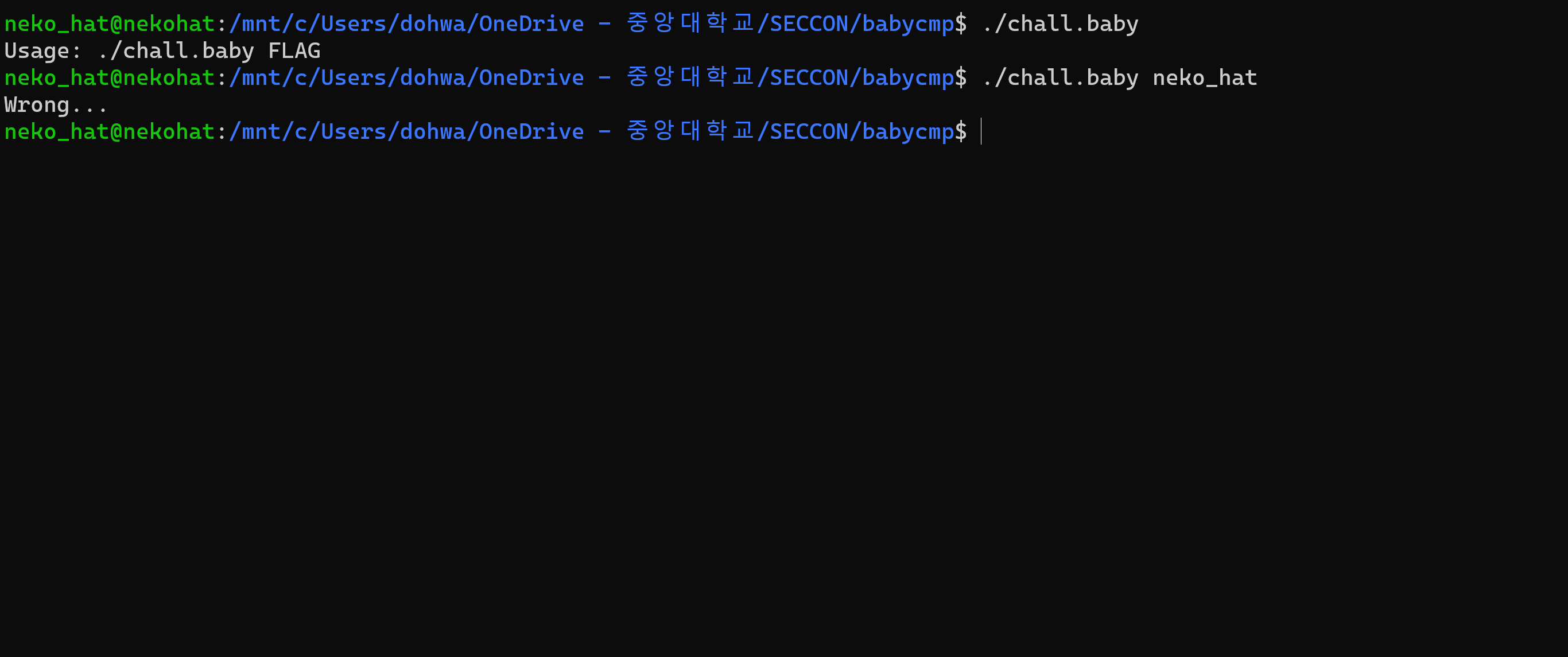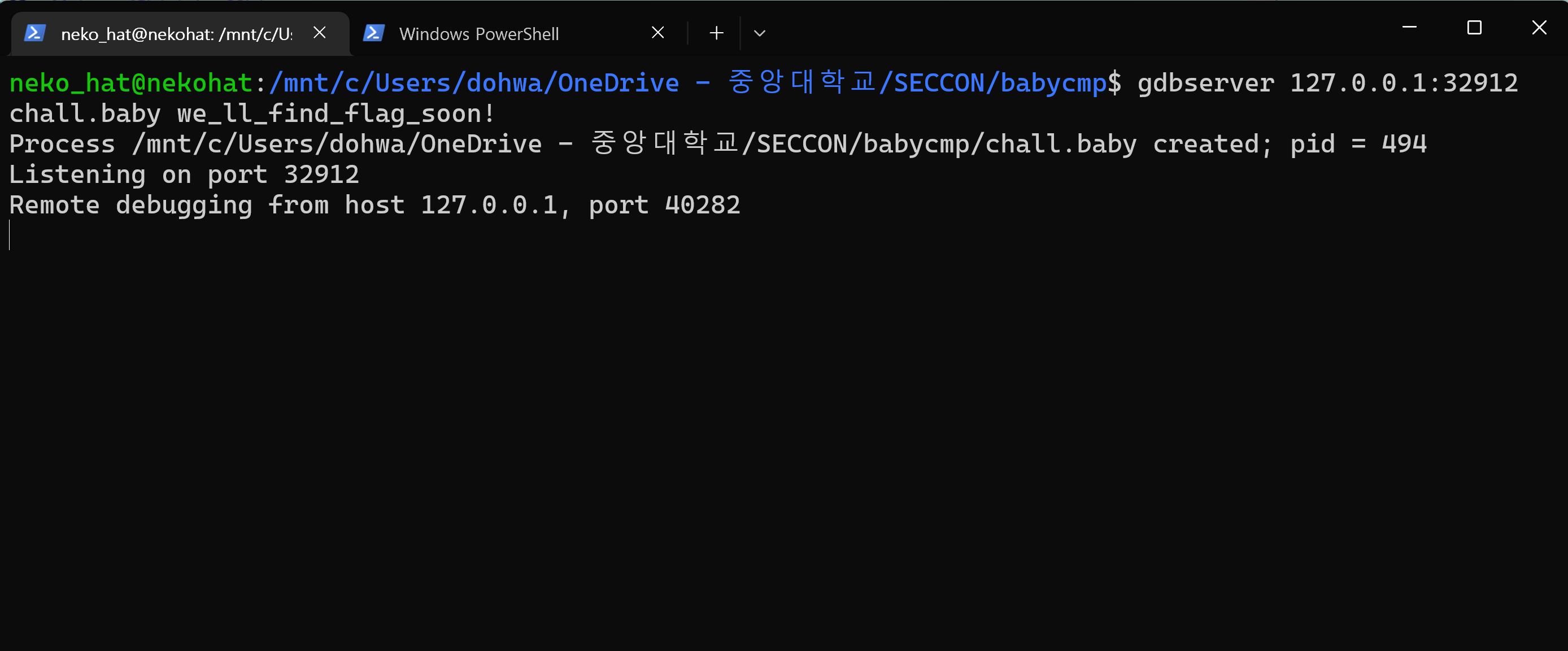TAG
babycmp-en

The problem is the baby file. There is no information about the file, so we checked the information about the file through the ‘file’ command.
It’s ELF64-bit file, Linux executable. Let’s run the applicable program.

The information shows that if you enter the FLAG value as a factor in the program, it will verify that the FLAG is correct.
Let’s use IDA for program analysis.
int __cdecl main(int argc, const char **argv, const char **envp)
{
const char *v5; // r12
size_t v10; // rax
size_t v11; // rdi
unsigned __int64 v12; // rcx
const char *v13; // rsi
__int64 v14; // rax
unsigned __int64 v15; // rdx
int v16; // er12
__m128i v18; // [rsp+0h] [rbp-68h]
char v19[8]; // [rsp+10h] [rbp-58h] BYREF
__m128i v20; // [rsp+20h] [rbp-48h]
__m128i v21; // [rsp+30h] [rbp-38h]
int v22; // [rsp+40h] [rbp-28h]
unsigned __int64 v23; // [rsp+48h] [rbp-20h]
v23 = __readfsqword(0x28u);
_RAX = 0LL;
if ( argc <= 1 )
{
v16 = 1;
__printf_chk(1LL, "Usage: %s FLAG\n", *argv);
}
else
{
v5 = argv[1];
__asm { cpuid }
v22 = 3672641;
strcpy(v19, "N 2022");
v20 = _mm_load_si128((const __m128i *)&xmmword_3140);
v21 = _mm_load_si128((const __m128i *)&xmmword_3150);
v18 = _mm_load_si128((const __m128i *)&xmmword_3160);
v10 = strlen(v5);
v11 = v10;
if ( v10 )
{
*v5 ^= 0x57u;
v12 = 1LL;
if ( v10 != 1 )
{
do
{
v13 = &argv[1][v12];
v14 = v12 / 0x16
+ 2 * (v12 / 0x16 + (((0x2E8BA2E8BA2E8BA3LL * (unsigned __int128)v12) >> 64) & 0xFFFFFFFFFFFFFFFCLL));
v15 = v12++;
*v13 ^= v18.m128i_u8[v15 - 2 * v14];
}
while ( v11 != v12 );
}
v5 = argv[1];
}
if ( *(_OWORD *)&v20 == *(_OWORD *)v5 && *(_OWORD *)&v21 == *((_OWORD *)v5 + 1) && *((_DWORD *)v5 + 8) == v22 )
{
v16 = 0;
puts("Correct!");
}
else
{
v16 = 0;
puts("Wrong...");
}
}
return v16;
}
This is the decompile of the main function.
An inputted value argv[1] is stored in v5, and the length of the corresponding character string is stored in v10, v11 to be used for checking the length of the input value.
if ( v10 )
{
*v5 ^= 0x57u;
v12 = 1LL;
if ( v10 != 1 )
{
do
{
v13 = &argv[1][v12];
v14 = v12 / 0x16
+ 2 * (v12 / 0x16 + (((0x2E8BA2E8BA2E8BA3LL * (unsigned __int128)v12) >> 64) & 0xFFFFFFFFFFFFFFFCLL));
v15 = v12++;
*v13 ^= v18.m128i_u8[v15 - 2 * v14];
}
while ( v11 != v12 );
}
v5 = argv[1];
}
A pointer v5 pointing to the input value argv[1] is *(v5)^=0x57 (InputVar[0]^=0x57)
In the repetitive sentence, argv[1][v12] is received by v13, and v13^=v18.m128i_u8[v15-2v14].
//cal.c
//gcc -o cal cal.c
#include <stdio.h>
#include <stdint.h>
#define uint128_t __uint128_t
void main()
{
uint64_t v15;
int64_t v14;
uint64_t v12 = 1LL;
for(int i = 0; i <= 30; i++)
{
v14 = v12 / 0x16 + 2 * (v12 / 0x16 + (((0x2E8BA2E8BA2E8BA3LL * (unsigned __int128)v12) >> 64) & 0xFFFFFFFFFFFFFFFCLL));
v15 = v12++;
printf("v14 = %lld\tv15 - 2 * v14 = %lld\n", v14, v15 - 2 * v14);
}
}
For complex v14 value calculations, the above code was created and calculated.
v14 = 0 v15 - 2 * v14 = 1
v14 = 0 v15 - 2 * v14 = 2
v14 = 0 v15 - 2 * v14 = 3
v14 = 0 v15 - 2 * v14 = 4
v14 = 0 v15 - 2 * v14 = 5
v14 = 0 v15 - 2 * v14 = 6
v14 = 0 v15 - 2 * v14 = 7
v14 = 0 v15 - 2 * v14 = 8
v14 = 0 v15 - 2 * v14 = 9
v14 = 0 v15 - 2 * v14 = 10
v14 = 0 v15 - 2 * v14 = 11
v14 = 0 v15 - 2 * v14 = 12
v14 = 0 v15 - 2 * v14 = 13
v14 = 0 v15 - 2 * v14 = 14
v14 = 0 v15 - 2 * v14 = 15
v14 = 0 v15 - 2 * v14 = 16
v14 = 0 v15 - 2 * v14 = 17
v14 = 0 v15 - 2 * v14 = 18
v14 = 0 v15 - 2 * v14 = 19
v14 = 0 v15 - 2 * v14 = 20
v14 = 0 v15 - 2 * v14 = 21
v14 = 11 v15 - 2 * v14 = 0
v14 = 11 v15 - 2 * v14 = 1
v14 = 11 v15 - 2 * v14 = 2
v14 = 11 v15 - 2 * v14 = 3
v14 = 11 v15 - 2 * v14 = 4
v14 = 11 v15 - 2 * v14 = 5
v14 = 11 v15 - 2 * v14 = 6
v14 = 11 v15 - 2 * v14 = 7
v14 = 11 v15 - 2 * v14 = 8
v14 = 11 v15 - 2 * v14 = 9
The above results were obtained.
That is, v15-2*v14=SomeVar%22
v18 = _mm_load_si128((const __m128i *)&xmmword_555555557160);
then, v18 is initialized as above
if ( *(_OWORD *)&v20 == *(_OWORD *)v5 && *(_OWORD *)&v21 == *((_OWORD *)v5 + 1) && *((_DWORD *)v5 + 8) == v22 )
{
v16 = 0;
puts("Correct!"ㅁ);
}
else
{
v16 = 0;
puts("Wrong...");
}
By looking at the ‘if’, the code is the code used for FLAG verification, and variables to be confirmed are v18, v20, v21, v22
Checked with IDA to obtain values for v18, v20, v21, v22.
v20 = _mm_load_si128((const __m128i *)&xmmword_555555557140);
v21 = _mm_load_si128((const __m128i *)&xmmword_555555557150);
v22 = 3672641;

Debugging progresses because the initialization state is difficult to understand in the above information. Try running gdbserver for debugging progress on IDA.




The following values can be seen: Afterwards, v18 is initialized in combination with v19. (union)
//v18.m128i_u8
MEMORY:00007FFFFFFFDB00 db 57h ; W
MEMORY:00007FFFFFFFDB01 db 65h ; e
MEMORY:00007FFFFFFFDB02 db 6Ch ; l
MEMORY:00007FFFFFFFDB03 db 63h ; c
MEMORY:00007FFFFFFFDB04 db 6Fh ; o
MEMORY:00007FFFFFFFDB05 db 6Dh ; m
MEMORY:00007FFFFFFFDB06 db 65h ; e
MEMORY:00007FFFFFFFDB07 db 20h
MEMORY:00007FFFFFFFDB08 db 74h ; t
MEMORY:00007FFFFFFFDB09 db 6Fh ; o
MEMORY:00007FFFFFFFDB0A db 20h
MEMORY:00007FFFFFFFDB0B db 53h ; S
MEMORY:00007FFFFFFFDB0C db 45h ; E
MEMORY:00007FFFFFFFDB0D db 43h ; C
MEMORY:00007FFFFFFFDB0E db 43h ; C
MEMORY:00007FFFFFFFDB0F db 4Fh ; O
MEMORY:00007FFFFFFFDB10 db 4Eh ; N
MEMORY:00007FFFFFFFDB11 db 20h
MEMORY:00007FFFFFFFDB12 db 32h ; 2
MEMORY:00007FFFFFFFDB13 db 30h ; 0
MEMORY:00007FFFFFFFDB14 db 32h ; 2
MEMORY:00007FFFFFFFDB15 db 32h ; 2
MEMORY:00007FFFFFFFDB16 db 0
Let’s create a decryption code with input value encryption logic.
//exploit.c
//gcc -o exploit exploit.c
#include <stdio.h>
#include <string.h>
int main()
{
char *key = "Welcome to SECCON 2022";
char target[] = {0x4, 0x20, 0x2F, 0x20, 0x20, 0x23, 0x1E,0x59,0x44,0x1A,0x7F,0x35,0x75,0x36,0x2D,0x2B,0x11,0x17,0x5A,0x3, 0x6D,0x50,0x36,0x7, 0x15,0x3C, 0x9,0x1, 0x4, 0x47,0x2B,0x36, 0x41, 0x0A, 0x38};
for(int i = 0; i<sizeof(target)/sizeof(char); i++)
target[i] ^= key[i%strlen(key)];
printf("%s\n", target);
return 0;
}

FLAG: SECCON{y0u_f0und_7h3_baby_flag_YaY}
